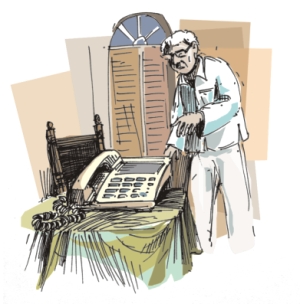|
View from the Bottom And then there were none...
Shahnoor Wahid
When was it that an extended family lived in its entirety under one single roof, sharing food and good times together? Sounds like a Bengali novel? Perhaps. Not too long ago, growing up was somewhat less complicated an affair for the young ones, in a safe, insulated environment, with everyone taking care in one way or the other. The house would be filled with aunts and uncles, nephews and nieces, most of them in their adolescence. There would be at least one bekar (unemployed) graduate mama or chacha (uncle) in the house, usually living in a small room downstairs, reading novels all the time.
 The elderly members of the family like aunts and grandmothers were the darlings of the children as they allowed them all sorts of indulgences otherwise forbidden by parents. Be it getting some pocket money to buy pickles outside school or sneaking out during noon time to go to a friend's house to read the latest story of Dashhu Bahram or Dashhu Mohan. The elderly members of the family like aunts and grandmothers were the darlings of the children as they allowed them all sorts of indulgences otherwise forbidden by parents. Be it getting some pocket money to buy pickles outside school or sneaking out during noon time to go to a friend's house to read the latest story of Dashhu Bahram or Dashhu Mohan.
Even the arrival of a relation, maybe a distant cousin of mother or father, with a tin full of moa or naru or pitha and a pair of dry coconuts in hand, would send thrills among the children. The elders would be equally happy to receive the guest from the village or from another district town because that would mean a week of exchanging information and gossiping. Those were the days when newspapers were hard to come by in small towns and radio was a luxury in most families. Electricity was also not a common household commodity in a small town. Such visitors were a never ending source of fun for the young. They would go to the market or a fair or a circus show with the guest. He or she would buy hawamithai or some kadma much to the glee of the children. In the evening children would gather round the visitor to listen to a fairytale or a ghost story.
Today, with modernity having its way into our lives, the definition of an extended family is undergoing fast and often painful changes. Aunts, uncles and grandmothers prefer to live separately and visit us as guests. And a distant cousin? Who is he anyway? Mark Twain had said 'Fish and visitors stink on the third day.' But, in the present day world, a visitor, a cousin from the village, 'stinks' from the very first moment of arrival, and our city-bred children make no fuss in making it known to them. Though concrete roads and luxury buses are bringing villages closer to the towns, our mental distance with our rural cousins and loving and caring phupoos and khalas is getting wider.
Then we have another type of Bangladeshi family, the kind that modernity has splintered into two or three parts. One part lives in Dhaka, another in Australia and the remaining part in America. Children and adolescents are separated from mother or father, sent abroad to live with an unknown family or in a dormitory where the walls are cold. The memory of grandfather or grandmother fades away quickly, and there is little room in the minds for uncles or aunts. Often a mother finds a job in the USA and decides to live amidst the lights and dins of a 'modern city'. The dollars when converted into taka appears an astronomical sum. She has to work hard to give her children good education and find a good job for them. The father cannot find a respectable job overseas and prefers to live in Dhaka fighting to keep his respectability intact. Emails and phones somehow keep the children from forgetting their father.
Age creeps up fast and bends father's backbone. He lives on yellow, blue and red pills three times a day and runs to the phone every time it rings my children, my children? But, no. It's a colleague enquiring about his sugar level. The old father opens the cupboard and fondly touches the clothes of his children. He holds them against his face. Ah, my children! He wonders how fast his children grew up! He opens a door and looks inside the room where they lived. The room looks just the way it did twenty years ago!
It's time for his blood pressure pill. He closes the door and drags his body to his room....was that the phone?....my children....?
Copyright
(R) thedailystar.net 2006 |
